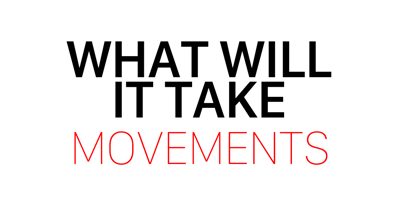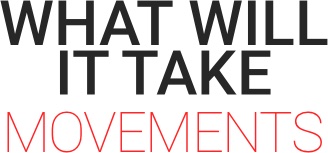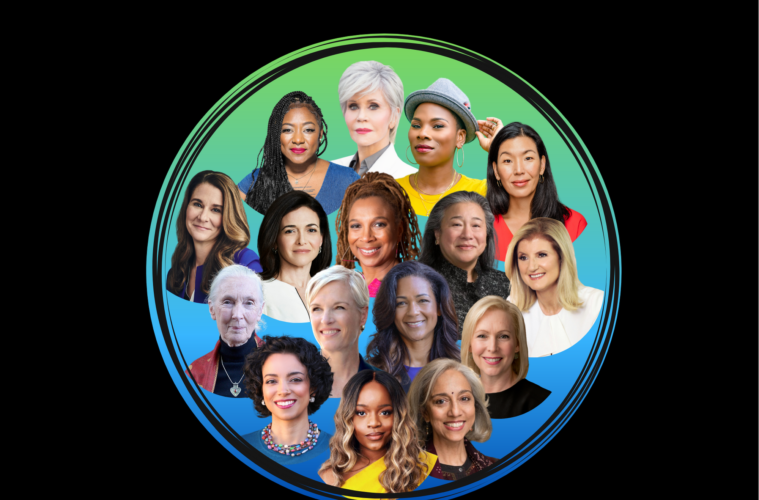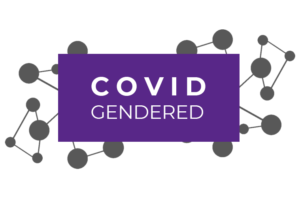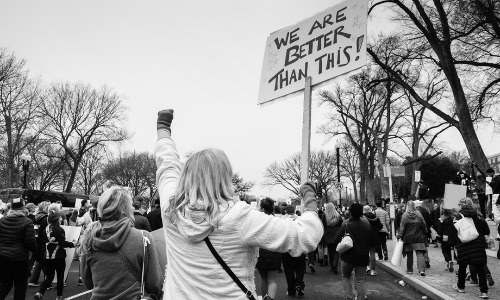By Marianne Schnall
It has been an unrelenting and rough year and a half. We have faced a global pandemic that has sickened millions and caused over 630,000 American deaths, a national reckoning over systemic racism and racialized police violence, destructive wildfires and hurricanes linked to the climate crisis, and the pandemic causing economic devastation with record levels of unemployment, thousands of small businesses to close, hundreds of thousands of women to leave the workforce, and worsening levels of food insecurity—and all of these factors have disproportionately affected women and people of color.
If we try to find a silver lining in all of this, it could be that these crises have dramatically exposed the many flaws, cracks, and inequities in our systems, giving us a rare opportunity to rebuild in a way that creates new paradigms and values and cares for all members of society equally, as well as the earth.
I spent the past year and a half interviewing a diverse group of female thought leaders who shared their insights and expertise on where we must focus our efforts to ensure the world that emerges post COVID-19 is more just, sustainable, and equitable. I went through these interviews and selected a small sampling to help illuminate the work ahead. There is no question that women, and particularly women of color, will need to be at the forefront to help lead the way.
As we look ahead at all the work that must be done, my hope is that the wisdom of these women will help guide us forward. May it serve as a beacon of hope and a call to action for us all to get involved and use our time, talents, and resources to build a better world.
1. Advance Gender Equity and Women’s Leadership
“Women have always been at the forefront of some of the most influential movements for social change, and this is certainly that moment where change is inevitable. Whether it be the movement for trans liberation, equal pay, the right to vote, or the right to live equally—women have led the charge. We need women to lead in this moment who are not simply satisfied with achieving the status of men—we need women leaders who are ready to transform our whole set-up so that no one is left behind.”
ALICIA GARZA
Principal of Black Futures Lab and co-creator of #BlackLivesMatter and the Black Lives Matter Global Network
“I hope that recognition of how essential women are to our country and economy is reflected in major shifts in the way our country treats women. That means electing more women. It means providing women with equal pay for equal work. And it means providing universal paid leave so that no one is forced to choose between their job and their family. Women need to put themselves at the forefront of the reset and push for bold, transformative policies that will fundamentally reshape the way we work and live.”
KIRSTEN GILLIBRAND
Democratic New York Senator, Founder of Off the Sidelines
“Without a doubt, women should lead us out of this crisis, whether as world leaders, as front-line workers, or as front-line caregivers and teachers. But our current system still has built-in barriers, and it shows: from our patchwork of paid sick and paid family leave laws to the lack of affordable childcare and the gender and racial pay gap. If there’s one good thing that can come from this, it would be if everyone—business leaders, policymakers, and the public at large—decided to build a more just and equitable society in place of the one that we have now.”
TINA TCHEN
President and CEO of TIME’S UP NOW
“If women are not at the tables where new systems are shaped—everything from global health systems to climate justice to a new global economic model—then it won’t be a reset; it will be a repeat of past mistakes, abuses, and injustice. This global pandemic is a big opportunity for women to step forward, support each other for leadership and to bring all our experiences, natural attributes, and shared learnings to shift the paradigm of power and lead the world from dangerous times to envision a different way forward.”
PAT MITCHELL
Media executive, author, and the editorial director of TEDWomen
“We are missing out on the brilliance of so many people that society is told to be quiet: women, women of color, immigrant women, Muslim women, Jewish women, disabled women and trans women have continuously been told over and over and over again to be quiet and wait our turn. And then our turn never comes. What are we missing as a society by all of the things that are bound up in the minds of the women and nonbinary people that we continuously tell to hold on, that we continuously tell to wait? We’re all losing out when we silence voices, when we discourage confidence and when we discourage ambition. And the sooner we can realize that, the sooner we’ll all benefit from the ambitious women that society seems so afraid of.”
BRITTANY PACKNETT CUNNINGHAM
Activist, educator, writer, leader; NBC News and MSNBC contributor; founder and principal of Love & Power Works
2. Advance Racial Justice and Racial Equity
“Representation in leadership across sectors has to include a vision that includes all of us; it can’t be enough to have Black women in positions of power if all we are doing is maintaining the current state of affairs and the balance of power as it is now. We need to invest in Black women leaders, expanding the infrastructure necessary to train Black women to play the critical roles needed to govern in this country. We also need to make sure that Black women are in positions of leadership throughout our communities—in our places of worship, in our workplaces, in our boardrooms and in our halls of power.”
ALICIA GARZA
Principal of Black Futures Lab and co-creator of #BlackLivesMatter and the Black Lives Matter Global Network
“The thing is, Black people always fight for ourselves, but in this moment, those who consider themselves allies have to find the fire for the fight and fight just as hard as we do. So as everybody’s putting ‘Black Lives Matter’ on the grounds of cities, organizers are still fighting. People need to make sure they’re donating to organizations. People need to make sure they’re amplifying voices that are typically not heard. People need to make sure they’re writing the letters to the district attorneys and asking for justice for those whose lives have been taken. Even when it’s no longer trending on Twitter or Instagram or Facebook, we cannot forget the fight.”
LUVVIE AJAYI
New York Times bestselling author, speaker, host of Rants and Randomness podcast and Curator of LuvvNation
“It shouldn’t have taken a disease to make liberals, and progressives as well, rethink their reliance on inequality as a product of deficits in people and cultures, rather than it’s a problem of damaged institutions that have never really reconstituted themselves after segregation. So I’m of the mind that you gotta dig a little on the ground you think you’re standing on, so you can actually see that much of what you take for granted in society is actually layers upon layers of inequalities that have allowed for a baseline that’s fundamentally unequal and a product of white supremacy to just be taken as the natural point of departure for all things.”
KIMBERLÉ CRENSHAW
Co-founder and executive director of the African American Policy Forum; professor of law at UCLA and Columbia Law School; host of Intersectionality Matters podcast
“We have to confront this system that we are a part of that we perpetuate and that we have internalized. You should be looking around at your workplace, whether you run it or not. You should be looking around at your household, your own habits, your own friendships. We should all be looking at the ways in which we are either perpetuating systems of systemic injustice or we are operating as an oppositional force. That is what we mean when we say being actively anti-racist. It is going to require that not only have you turned away from systemic racism, but that you are running hard and fast in the other direction and gathering as many people along with you to create the oppositional force that is needed to reverse the promised direction of our future.”
BRITTANY PACKNETT CUNNINGHAM
Activist, educator, writer, leader; NBC News and MSNBC contributor; founder and principal of Love & Power Works
“Black women are uniquely positioned to lead the nation forward in this moment. For centuries, Black women have courageously fought to extend the scope of justice and civil rights for everyone. We have stood as the moral counterpoint to an anti-democratic system built to privilege white men over everyone else. There is no simple way to right the centuries of wrong in this country. We don’t simply need allies in positions of power. Instead, we need allies to cede their power to us and allow Black women and our communities to lead. For some, the phrase ‘trust Black women’ is a new and compelling call to action. Let’s see that call heeded in real time. Black women have the experience, acumen, ability and heart to fight to make economic and racial justice real—and we must have executive leadership, access to deep resources and vocal support from every race and gender to get our country out of the mess we are in.”
AIMEE ALLISON
Founder and president of She the People
3. Create a Better Model of Working
“What the pandemic did was accelerate trends that were already breaking down the old model of working. We were already being forced to change the way we work and live, and the pandemic just sped that future up. The old model was fueled by stress and burnout and being always ‘on.’ When work was moved into the home for so many, it became impossible to ignore our need to rebuild those boundaries around our work and our home lives. A central part of the ‘new normal’ will be a more human-focused way of working, one built around what actually makes us productive and what makes us thrive.
We’re seeing an incredible need from employees for support beyond just physical safety. Employees also need support for their psychological safety and the resilience necessary to be creative instead of reactive, or just trying to get through the day. Companies need to nurture their employees’ individual resilience. That means putting into place ways of working that allow people to operate from a place of strength, calm, and empathy.”
ARIANNA HUFFINGTON
Founder and CEO of Thrive Global
“[Lean In’s Women in the Workplace report shows that] more than one in four women, including a lot of senior women, are saying they’re considering downsizing their jobs or leaving the workforce. That’s a disaster; that threatens to undo literally what has taken us years of progress for women in the workplace. We absolutely need to fix this and need to fix this immediately.
Now is a moment for us to take this and make work work for parents. Get rid of the discrimination against mothers, get rid of the discrimination against race, get rid of the discrimination on gender. This report is a call to companies to lean in—lean in and keep the women in your workforce that you’re going to need to be successful. The time to make those changes is definitely now.”
SHERYL SANDBERG
COO of Facebook and cofounder of Lean In
“We can raise awareness about the many economic benefits of diversity and inclusion for companies. The economy as a whole suffers as a result of the enormous lost potential of women and people of color who are effectively or literally chased out of jobs or whose careers stall before they rise through the ranks to positions of power. It also makes good business sense: research shows that companies with more diverse leadership make better business decisions. By extension, the same should be true for our government.”
TINA TCHEN
President and CEO of TIME’S UP NOW
“What can businesses do? Employers are going to have to be incredibly flexible with their workforce because you’ll have some workers who can come back right away, some who will come back but then need to go out because they have a sick family member or they get sick, or you’ll have some workers who can’t come in right away because they don’t have childcare. Employers can be more flexible in their work hours where they can. They can change over some of the shifts in the way they do that for their assembly line workers or their warehouse workers. They can give credits for childcare options. And long term, even think about even childcare solutions that maybe are onsite. We’ve got to be creative during this time.”
MELINDA GATES
Co-chair of the Bill & Melinda Gates Foundation and founder of Pivotal Ventures
“There are systemic things we need in this country. First and foremost, we need a commitment to equal pay—that regardless of your gender, you get paid for the work that you do. We all know the numbers, and of course it’s more profound for women of color in terms of unequal access to pay. We need maternity care and childcare that is available for everyone, regardless of where they work. We need paid family leave, like every other industrialized country, and we need paid sick leave. These are fundamental policy changes. What we want from the next administration and what we want from the next Congress is to put these issues at the top of the list, not at the bottom of the list. Because they’re not only good for women—they’re good for families and they’re good for the economy.”
CECILE RICHARDS
Author, cofounder of Supermajority
“Something that I think is positive that’s coming out of the pandemic is, we talk about essential workers—you notice CEOs are never referred to as essential workers. I don’t think that we really realized the importance of the checkout counter clerks and the people who put stuff in bags for us and who deliver things and and nurses and the people who pick our food. I think that there is a growing respect and understanding for the importance of these workers. We’re understanding why we’re calling them essential workers. And I think that we are horrified to see that these so-called essential workers are treated as totally dispensable. So what we have to do is turn the weekly applause for them into permanent healthcare, family sick leave, overtime pay, protective gear, a decent wage—all of those things that they deserve. I think people are more willing to see that and fight for it.”
JANE FONDA
Actress, activist, creator of Fire Drill Fridays
4. Restructure Our Caregiving Systems
“Our economy is built on the back of women’s caregiving, and we never address that as a nation. We don’t put the right policies in place such as paid family medical leave—we’re the only industrialized nation that doesn’t have that policy—and that is holding women back.
We can begin by recognizing the fact that our caregiving system has been broken, and if we are going to reopen this economy, this is one of the keys to reopening the economy, to unlocking it again. So we have to recognize the fact that of our nurses who are out on the front lines taking care of us, 86% of them are women. Of the primary caregivers in this country, 75% are women. Low-wage workers who we’re calling essential, we know their jobs are essential—62% of them are women. So if you want to reopen this economy, you better make sure you’re going to protect and keep those women safe because they’re the ones who are caring for everybody else. They’re the ones who are the primary caregiver at home for the young children or the elderly parents. You’re not going to be able to reopen the economy unless you’re really addressing these issues.”
MELINDA GATES
Co-chair of the Bill & Melinda Gates Foundation and founder of Pivotal Ventures
“Coronavirus is compounding the enormous pressure that women are already under every single day. Almost two-thirds of all minimum wage workers in the US are women, meaning that most of the workers in the most vulnerable parts of our economy are women. Simultaneously, women are performing unpaid work that their families rely on: caring for children, caring for family members and loved ones who need care due to age, illness or disability, and caring for the home. Women return home from work to begin more work—care work—that isn’t recognized in the economy, and now that pressure is being enormously compounded by school closures and homeschooling, family members who are elderly needing support as nursing homes are closed due to coronavirus, and loss of wages as the US economy faces its greatest unemployment crisis since the Great Depression.
As hard as it is to picture right now, when we reach the other side of this crisis, we cannot rebuild with the goal of returning things to ‘normal,’ to the way things have been. We must create a new normal that values women’s work, that protects the workforce of workers doing work that was traditionally done by women, and we must support our caregivers, whether they are professionals or family. Our future economic and social resilience relies on it, and the generations coming after us deserve it.”
AI-JEN POO
Executive director of the National Domestic Workers Alliance, co-director for Caring Across Generations and a cofounder of Supermajority
“Mothers are 1.5 times more likely than fathers to be spending an extra three or more hours a day on housework and childcare—equivalent to 20 hours a week. That’s half a full-time job! And women of color are doing even more. They are more likely to be doing 100% even when they have partners in their homes. So what does that mean? It means we need to fix the balance. Women have to do things, men have to do things, companies have to do things—everyone has to lean in and make work work for people.”
SHERYL SANDBERG
COO of Facebook and cofounder of Lean In
5. Save the Planet
“As we destroy the environment, mother nature is actually screaming for help now…. When it comes to the pandemic, we destroy habitats. We push animals into closer contact with people in some cases. This can create a situation where a pathogen can jump from an animal to a person and may create a new disease…. And as we continue to destroy nature, we’re destroying the future of our children, let alone the health of the planet.
I see many signs of hope, and I think there’s a window of time we can mitigate climate change. Think about what you do every day and to make ethical, compassionate choices in what you eat, what you buy, what you wear. And just realize that it’s not you alone—together, collectively, we are making a difference. And there is a window of time, but we’ve got to get together and take action now. ”
JANE GOODALL
World renowned ethologist, environmentalist, founder of the Jane Goodall Institute and Roots & Shoots
“We are at a moment—because we haven’t acted sooner—where we have a very small window of opportunity. I think there’s nine and a half years left, according to the scientists, to cut our fossil fuel emissions in half. That is so hard to do, but it’s doable. But it’s not going to be doable if this government spends billions of dollars on the fossil fuel industry and nothing on renewables, nothing on the infrastructure that would make a transition to a fossil free future possible.
We have to force [Biden] to pass a Green New Deal because when that happens, the communities that are the most hurt by economic inequities and the climate crisis and racism and pollution will be the first to be lifted up and helped. It lays the groundwork for a just transition and for taking care of exactly the very workers that are dropping on the front lines. Teachers and nurses and transportation workers and farm workers and all these very vulnerable people—of course, mostly women and people of color, the same people that are the most impacted by the climate crisis. It will create decent wages, family-supporting wages for people. It will pay attention to farmers and rural communities, as well as cities and suburbs. It’s a path forward that shows us when we leave fossil fuels behind and we move to clean energy, so many things become less expensive and clean. And how we feel now when we look out the window and we see clean air, we hear bird songs, and we see animals starting to come out and all these things—this can be our future.”
JANE FONDA
Actress, activist, creator of Fire Drill Fridays
“This pandemic is a signal that our house—the house of this country and this planet—has been on fire for some time now. We are approaching the point of no return. The people in philanthropy who have enough sense to know what time it is are overwhelmingly women of color, transgender people of color and white women allies. We know that the time for timidity has passed. The time for waiting for the right moment to spend our political capital as people working in philanthropic institutions has passed. We have to do the right and courageous thing, and we have to do it now.
We are in a countdown to a climate change apocalypse. You can’t take your millions with you—give it away while there is still a chance of saving the one planet we have!”
VANESSA DANIEL
Founder and executive director of Groundswell Fund
6. Keep Visualizing the Future We All Deserve
“A new improved world to me looks like one where we have true equality for everybody in society. Real equality. Let’s open up the diverse perspectives [of women] and build the world that we want, that takes care of everybody in our human family and, quite frankly, takes care of the earth as well. We have a chance to do a rethink on society and what we want both for future generations and for this earth.”
MELINDA GATES
Co-chair of the Bill & Melinda Gates Foundation and founder of Pivotal Ventures
“[My highest, most aspirational vision] is true liberation—that we are not just being innovative about how to get people over the barriers, but that the barriers don’t exist. And that all people are able to not just survive but thrive and are able to live in a society that does not kill the genius within them. It means a world where young people are able to grow up and live their wildest imagination because they are embraced and nurtured from the very beginning instead of turned away from what’s possible. I have an absolute belief that these are the things that can be true and that we can uproot the trees that don’t feed us all well and plant in their place trees that bear fruit for all people.
We have to see justice as fully equitable, free, liberated societies where not only can people live and survive but all people can thrive. And that requires an understanding that every single system is interconnected, that we were never just talking about policing: we’re talking about economics, we’re talking about education, we’re talking about housing, we’re talking about the carceral state, we’re talking about healthcare, we’re talking about mental health care, we’re talking about full employment. All of those things work together to dictate whether somebody can only struggle to survive or whether they can truly thrive. A world where everybody can truly thrive is what is actually a just world.”
BRITTANY PACKNETT CUNNINGHAM
Activist, educator, writer, leader; NBC News and MSNBC contributor; founder and principal of Love & Power Works
“Imagine a world where a woman’s work—all of a woman’s work—is valued for the contributions she is making to our society, to our economy, and to the lives of the people she keeps safe and cared for. Imagine the resilience of an economy that values women’s work equally to what men do and compensates caregiving work as a critical function our society relies on. Imagine the strength of a society where rather than rendered invisible, care was seen as the foundation that our economy must be built on in order to thrive. This is the world that we must create together.”
AI-JEN POO
Executive director of the National Domestic Workers Alliance, co-director for Caring Across Generations and a cofounder of Supermajority
“My highest aspirational vision to the extent that I can imagine it is a world where there are no traces of a past that categorized and treated a whole section of its population as utterly expendable. So it would mean that the person who is sitting at the helm of our organizations and our society and the person who is cleaning their office are not looking at fundamentally different life chances. That would be the most radical vision. And that they are not color coded or gendered. So a world in which those identifying marks don’t lose the ascriptive meaning that people embrace, but lose the hierarchical placement that those categories now represent in society. So no race is associated with being on the top or the bottom, nor is the top or the bottom a reflection of life chances. There is no top or bottom, and there are plenty of resources for everyone to live a sustainable life of satisfying pursuits and joy.”
KIMBERLÉ CRENSHAW
Co-founder and executive director of the African American Policy Forum; professor of law at UCLA and Columbia Law School; host of Intersectionality Matters podcast
7. Get Involved to Create Change
“The dual pandemics of systemic racism and coronavirus are pushing people to realize that just because this is the way things are, does not mean this is the way things need to be. People are taking power in their own hands to create the world they want.
I think it really comes down to accountability. It comes down to all of us recognizing that we have influence over the systems that govern us and the things that we consume. That we can stop buying things and start buying things; that we can start voting for folks and vote people out; that we can show up in all of the small and unsexy ways that are required of us as citizens—the city council meetings, the police and fire meetings, the school board meetings and the PTA meetings. And joining up with our local racial justice organizations and truly investing in them. There are organizations in your community that are addressing the very issues that you care most about. It might be voter suppression; it might be racial injustice; it might be gendered violence; it might be LGBTQ issues. Making sure that you are resourcing your local organizations with your time, talent, and treasure makes all the difference in the world. Because ultimately, I think, as individuals, we far too often leave change up to other people.”
BRITTANY PACKNETT CUNNINGHAM
Activist, educator, writer, leader; NBC News and MSNBC contributor; founder and principal of Love & Power Works
“Do the projects that you can do locally. You can go and volunteer in a shelter. You can volunteer in a soup kitchen. You can raise money to help the children. There’s an awful lot of things that we can do locally, and it makes you feel good—you’ve succeeded in something, you’ve done something, you can see the results of it. And then when you know that there are other people just like you doing the same thing, then what you’re doing is multiplied and multiplied and multiplied, and changing the world. And then you have hope.”
JANE GOODALL
World renowned ethologist, environmentalist, founder of the Jane Goodall Institute and Roots & Shoots
“The pace and direction of change depends on what we do in this moment and how we change. Real change relies on white people divesting from white supremacy and directly confronting and challenging white nationalism. Real change depends on changing the way we act, not just the way we think. It means challenging the people who represent us to also represent the change we want to see in the world. So change, real change, depends on the steps we take right now. And my hope is that we choose to be bold, that we refuse to go back to the way things were—even when there aren’t people in the streets, there is still a much needed fight in our communities and in our city halls and state legislatures.”
ALICIA GARZA
Principal of Black Futures Lab and co-creator of #BlackLivesMatter and the Black Lives Matter Global Network
“My experience is, when I start flexing my activist muscles, when I start to do something that is bigger than me that is helping a bad situation, I tend to not be depressed anymore. I tend to feel empowered. So my advice is, always do something to help.”
JANE FONDA
Actress, activist, creator of Fire Drill Fridays
8. Put Your Money Where Your Hope Is
“These extraordinary times call for extraordinary giving. This is the time for philanthropy to increase our investments in the communities of women who are hardest hit by the COVID pandemic. The stakes are too high for funders to pull away when we are needed most. Not only do we want to immediately alleviate the suffering that this pandemic has caused, we also want to set the conditions for a better tomorrow. Our long-term goals as a foundation have always been to advance economic, gender and racial justice for marginalized communities. COVID exposes those inequities and pushes us to more urgently address these disparities for a better tomorrow.
Philanthropy is more than an act of giving; it’s taking action. And when women come together, there is a unique power held to create change. Our dollars are more powerful together.”
ANA OLIVIERA
President and CEO of The New York Women’s Foundation
“The coronavirus pandemic has shone a bright spotlight on the racial and structural inequalities that are eroding our democracy and stoking historic unrest—a combustible mix of frustration, anger and despair. The traditional approaches to philanthropy that we have leaned upon to address our greatest challenges have proven insufficient. We must chart a different path. It is time to harness the potential of women’s philanthropy to be a positive force for change.”
SARAH HAACKE BYRD
Executive Director of Women Moving Millions
“Women philanthropists come in every race, ethnicity, economic background, immigration status and identity. The combined power of all gift sizes is what built women’s funds and foundations into the global force they are today. Making even a modest financial contribution to a local women’s fund or foundation means you’re investing in the leadership, resources and decision-making power of women in your community. Whether you’re interested in serving as a board member for a local women’s foundation or simply volunteering for a few hours, donating your time, expertise, mentorship, in-kind service, or partnership-building potential, all are incredibly important and impactful to our work and the lives and well-being of women and girls.”
ELIZABETH BARAHAS-ROMÁN
President and CEO of Women’s Funding Network
“The root of the word ‘philanthropy’ means ‘love of humankind.’ The COVID-19 pandemic and the current uprisings for racial justice reveal women leading with love and demonstrating the power of care. If we wish to give financially, we do not have to wait to become Bill Gates or George Soros to demonstrate our love of humankind. Capitalism preaches excess consumption, but each of us can choose to invest what we may have otherwise spent on an outfit, dinner, or a show, on the causes we believe in.”
KAVITA RAMDAS
Director of Women’s Rights Program of Open Society Foundations
“One of the primary ways that women can effectively mobilize their money is by supporting women of color, women-of-color-led organizations and intermediary philanthropic organizations, like the Ms. Foundation for Women, which supports women of color. Right now is a time for radical allyship, and that requires radical actions in order to accomplish the radical change necessary for true equity in this country.”
TERESA YOUNGER
President and CEO of the Ms. Foundation for Women
“Give now. Give more than you think you can. Whether it’s donating money, time, voice or expertise, you have gifts to offer and they are needed now more than ever. It’s okay to take a risk. And it’s okay that not everything will be measurable. Giving when there is a need and because you can is an act of empathy and grace. Truly listen to the communities you serve and support to understand what is needed from you in this moment.”
JENNIFER ALCORN
Deputy Director, Philanthropic Partnerships of the Bill & Melinda Gates Foundation
This article was originally published at ForbesWomen.
 This story was produced in partnership with the International Women’s Media Foundation.
This story was produced in partnership with the International Women’s Media Foundation.
Marianne Schnall is a widely-published interviewer and journalist and author of What Will It Take to Make a Woman President?, Leading the Way, and Dare to Be You. She is also the founder of Feminist.com and What Will It Take Movements.
Visit COVID Gendered for more articles, information and resources.
